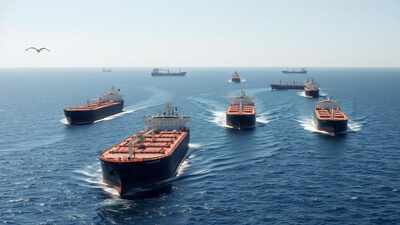ARTICLE AD BOX

With the Israel-Iran conflict escalating and tensions rippling across West Asia, India must urgently review its energy risks and trade weaknesses, the Global Trade Research Initiative (GTRI) has warned. In a statement on Sunday, GTRI said that the country is at a risk of collateral economic fallout and energy security, trade routes and commercial interests facing uncertainty. The thing tank urged government to swiftly diversify crude oil sourcing, review its energy contingency plans, and ensure that strategic petroleum reserves are adequately stocked. “The escalating hostilities and rising regional tensions are posing direct threats to India's strategic and economic links with West Asia” said Ajay Srivastava, founder of GTRI, adding that India has significant trade exposure to both warring nations. According to data shared by the think tank, India exported goods worth $1.24 billion to Iran and imported $441.9 million in return in 2024–25. Trade ties with Israel are even stronger, with exports reaching $2.15 billion and imports standing at $1.61 billion. However, Srivastava cautioned that bilateral trade figures tell only part of the story. “More critical than these bilateral flows is India's reliance on the region for energy: nearly two-thirds of its crude oil and half of its LNG imports pass through the Strait of Hormuz, which Iran has now threatened to close,” he said.
The narrow but strategic Strait of Hormuz handles nearly 20% of global oil shipments and remains vital to India, which imports over 80% of its energy. Any disruption, he warned, could trigger a chain reaction: fuel price spikes, shipping delays, surging insurance costs, inflation, rupee pressure, and fiscal instability. Concerns intensified on June 15 after Iran reportedly fired missiles at Israel’s Haifa port, a critical logistics hub that handles more than 30% of Israeli imports and is 70% owned by India’s Adani Ports, Srivastava said.
Initial assessments suggest damage to port infrastructure and nearby refineries, raising fears that Indian commercial interests could be directly affected. Meanwhile, Israel’s 14–15 June airstrikes targeting Houthi military leadership in Yemen have further unsettled the Red Sea corridor. Houthi forces have previously targeted commercial vessels, and the threat to India’s westbound trade is growing. “Nearly 30 per cent of India's westbound exports to Europe, North Africa, and the US East Coast travel through the Bab el-Mandeb Strait,” Srivastava noted.
Any need to reroute shipping via the Cape of Good Hope could add up to two weeks in transit time and significantly raise freight costs. Key Indian exports, including engineering goods, textiles, and chemicals, could face delays and higher transport costs, while crucial imports may also become more expensive. “India, though not a party to the conflict, cannot afford complacency,” Srivastava warned. “The government must urgently review energy risk scenarios, diversify crude sourcing, and ensure strategic reserves are sufficient.”



.png)
.png)
.png)
















 1 day ago
5
1 day ago
5









 English (US) ·
English (US) ·